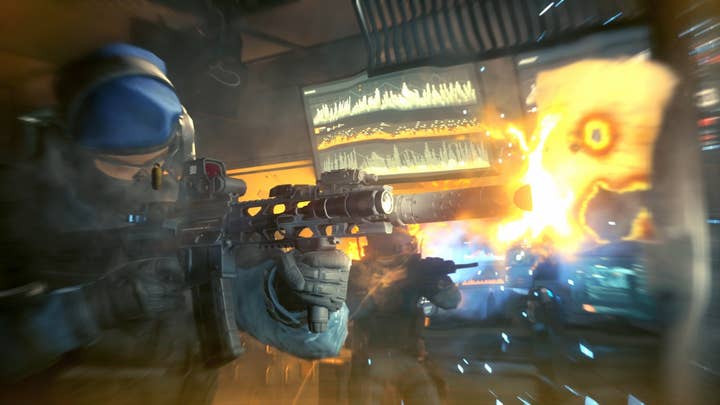Beyond Control: What's next for Remedy?
CEO Tero Virtala on Vanguard, the shared universe of the Epic-funded games and why two million sales still doesn't class Control as a major hit
Remedy Entertainment holds itself, and every title it produces, to a very high standard.
"When a Remedy game comes out, it needs to stand out in some way," explains CEO Tero Virtala. "For the genre or category we go into, it needs to have all the elements that make it a memorable or category-defining game. [That means] with our capabilities and the market opportunities, all of our games can and should be successful games."
We're talking to Virtala in the wake of a record financial year -- despite no new releases -- for the acclaimed Finnish studio, as well as its first Capital Markets Day just before Christmas: a series of presentations in which it updated investors on its vision for the future.
Within this, the developer set itself some lofty goals, including "to create several successful games, and at least one major hit." But how does Virtala define "major hit"?

Control has sold two million copies in less than two years, and continues to sell. This doesn't match the three million sales of Alan Wake, or even the four million managed by the original Max Payne, but the CEO is far from disappointed.
"We're really happy with the success of Control," he says. "It won Game of the Year awards, it has sold over two million units and continues selling -- but two million is not yet a major hit in our industry. When we talk about major hit games, we're talking on an industry level -- that's what we're aiming at."
When pressed further, Virtala is reluctant to put a figure on what constitutes 'major,' instead pointing to how the marketplace has changed. Now there are more ways to reach an audience than just selling individual copies of your game, thanks to services like Xbox Game Pass -- to which Control was recently added -- or giveaway promotions like the monthly PlayStation Plus games -- with one of February's choices being Control.
Case in point, Virtala tells us that some of the Control development team is still working on the game -- two years after launch -- in order to bring it to "selected new services and platforms," although he offers no specifics at this time.
"Three years ago, no one was talking about these Netflix-style subscription or streaming services [for games]," he says. "They were a concept, but not a reality for the short-term future. What we are seeing in the distance now is a variety of big players trying to establish a position in the subscription services [space]. There are also many players trialling and trying to introduce streaming platforms, which will definitely be one important area as we go into the future.
"Control won Game of the Year awards, it has sold over two million units and continues selling -- but that is not yet a major hit in our industry"
"Many of these services are building their future positions, so they're not necessarily seeing individual games as a sales opportunity per game but rather as user acquisition mechanics for their services, helping them build their services. That's opening a certain type of licensing opportunity for high-quality games."
The last point is no doubt a reference to Game Pass, a catalogue Xbox has been aggressively expanding to entice more players with the sheer value of the titles on offer. Meanwhile, Virtala also points to services where temporarily offering the game for free -- as Remedy has done via PlayStation Plus -- increases brand awareness and attracts a significant number of new players. This in turn "indirectly gives more vitality and supports longer-term sales."
He continues: "In the past, we would have said the target is to reach X amount of units in terms of sales. Now the world has changed with the digitalised marketplace and longer-lasting games that provide post-launch opportunities as well. [So] I don't want to say specific numbers.
"What I can say is [if] we guarantee the quality is going to be there, that there's uniqueness... the likelihood of not only creating successful games, but major successes increases all the time. For us, major success means for some of our games we would want to reach the global top-selling charts and the game would stay up there for a long time."

Remedy is also increasing its chances of finding that elusive major hit with the transformation it has undergone since 2017. Back then, the company was a single-project studio, typically taking four to five years on each title, and the fruits of its labour was always owned by someone else. Quantum Break is owned by Microsoft, the rights to Max Payne are held by Rockstar, and the rights to 2010's Alan Wake were only returned to Remedy two years ago.
The developer has since expanded and restructured, with Virtala proudly declaring it is no longer dependent on any single title or payments from any single partner. Today, Remedy has four teams across five games. The Control team is, in addition to ports for new services, starting work on the studio's next big title. A second team is working on co-operative multiplayer project Vanguard, while a third is working on two unannounced projects for console and PC, funded by Epic Games.
"In the past, we would have said the target is to reach X amount of units in terms of sales. Now the world has changed"
The final team is working with Smilegate on the single-player campaign that will be used in both Crossfire X and China-only Crossfire HD. Virtala points to this as a sign of how Remedy will continue to do some subcontracting as it did in the past.
All four teams are working on largely different titles, but the CEO states these -- and future games -- will be built around Remedy's core strengths. In his own words, these are: creating immersive gaming worlds, meaningful characters, and different types of stories, all combined with action gameplay. These, he says, are "the foundation of building long-lasting game franchises."
Certainly the Epic-funded games won't stray too far from Remedy's wheelhouse. While details are under wraps, Virtala did tell us both titles -- one positioned as a full AAA experience, the other as a smaller game -- are set in a shared universe. This alone gives Remedy the opportunity it hasn't had with most of its past releases.
"When we were focused on just creating one single story, I don't think we were utilising enough of all the hard work we did on creating the background for these worlds," he says. "With Control, we took the first step in giving players more reasons to spend more time in the world, explore them and that's been successful.
"With the project we're doing with Epic, it's in a world we want players to spend more time in. There's more opportunities to explore the world and the brand than in one single game."

Remedy's mysterious free-to-play multiplayer title Vanguard, on the other hand, takes the company into new territory. As such, the company is being more cautious with this one -- a luxury afforded by the new multi-project model.
Vanguard is also built on Remedy's strengths -- world, characters, story, and so on -- but attempts to apply them to a multiplayer experience at a time when such titles are dominating the industry. And Virtala is confident his team has found a gap in the market.
"It's not black and white anymore, in that either you make a standalone product or you make a full-blown service-based game"
"Multiplayer gaming is a highly competitive space, especially when you talk about PvP or team-vs-team games -- but in the co-op space, there are a few highly successful games," he says. "There's a clear reason for that: in PvP and team-vs-team, the content creation is not that big of an issue because the other players are the content -- they're always making the experience new, session after session.
"In co-op games, the challenge was often the content treadmill. In order to create long-lasting experiences, the developer cannot rely solely on handcrafting and making every single level and mission unique because that's not typically a path that's sustainable. We saw that there are unsolved questions about how a long-lasting, service-based co-op game could be made. If we can solve those problems, if we can bring the way we tell stories via the world and exploration, those could be elements we can utilise better in co-op than PvP."
Vanguard also tunes into another key objective for Remedy: "To own at least three expanding game brands, all with long-term hit potential." The best way to realise long-term potential in today's industry is with service-based games, updated for years after launch -- but Virtala is quick to assert that doesn't mean Remedy is abandoning standalone AAA products any time soon.
Again, he points to Control as an example: thanks to smart promotion and its growing reputation, the game enjoyed its best month to date in November 2020 -- more than a year after launch.
"It's not black and white anymore, in that either you make a standalone product or you make a full-blown service-based game," he says. "Every game needs to have mechanisms and reasons for players to get back into the game, spend more meaningful time in the game world than our previous games, but not all of them need to be service-based titles that last for years."
He concludes: "As we're evolving, it will mean that the games we launch will step-by-step be supported for a longer time. Even though not all of them will be live games that last for five or ten years, they will still be actively supported and expanded for the first couple of years.
"The idea is that, as the years go on, we'll have more and more games out there that are played by a growing number of players generating continuous revenue for us."

